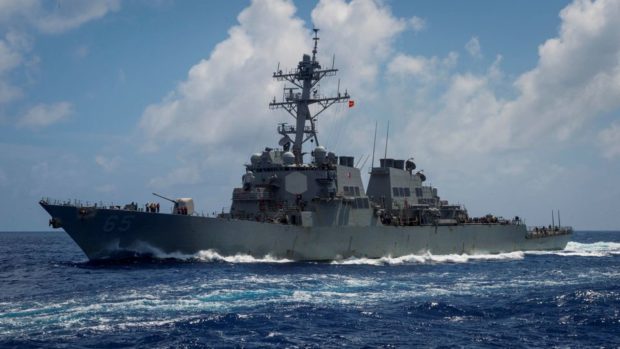
The Arleigh Burke-class guided-missile destroyer USS Benfold, forward-deployed to the U.S. 7th Fleet in the Indo-Pacific region, transits the Philippine Sea, June 14, 2018. (U.S. Navy/Handout via REUTERS)
MANILA, Philippines — “If you don’t prepare for an invasion then you will be invaded.”
So said retired Supreme Court Senior Associate Justice Antonio Carpio as he pointed out the need to preposition American weapons and military equipment in the country for defensive purposes amid Manila’s continuing sea dispute with Beijing.
“That is a message to China that we are ready, if you invade the Philippines or any of the maritime zones of the Philippines, we are ready. That is a message. That is deterrence, what you need really is deterrence. If you don’t have deterrence, then the other side will encroach on your territory,” Carpio said in an ANC interview.
Carpio cited the Philippines’ Enhanced Defense Cooperation Agreement (EDCA) with the United States.
Retired Supreme Court Senior Associate Justice Antonio Carpio
The agreement authorizes Washington to store defense equipment, supplies and prepositioned materiel at agreed locations.
The prepositioned materiel shall not include nuclear weapons, according to the pact.
“The war in Ukraine is an example. Ukraine is being attacked by Russia but Ukraine, there is no country that has put their defensive weapons to help Ukraine so Ukraine has to ask now, to beg for arms. The EDCA…the purpose of that is to preposition U.S. weapons in our bases so that if there is an attack, the weapons are there already,” Carpio said.
“You don’t have to wait for the weapons to be shipped because in this kind of war, the war could be lost or won in just a few days after the outbreak of war so you don’t have time to send weapons from another country, from the U.S. mainland or from Guam or from Hawaii,” he added.
Carpio’s statement comes following a reported “close distance manuevering” by a China Coast Guard vessel towards a Philippine Coast Guard ship patrolling off Scarborough Shoal in the West Philippines Sea early March.
China has claimed the shoal as its “inherent territory” and cautioned the Philippines against “interfering” with its patrols in the area.
Asked if his suggestion to preposition weapons in the country may be “too extreme” and could risk trade relations between the Philippines and China, Carpio answered in the negative.
“Of course not. That’s (prepositioning of weapons) happening. Not only weapons are prepositioned in South Korea and in Japan but also troops. And they still trade with China. I think that preposition of war materiel, weapons for defensive purposes is allowed. That’s for your self defense, that’s for your survival as a nation,” Carpio said.
“If you don’t prepare for an invasion then you will be invaded. And that’s what the Ukraine war has taught us. You cannot prepare when you are already being invaded. You cannot ask for arms when you are already being invaded. You have to have your arms before the invasion happens,” he added.
Manila and Beijing have been locked in a long-standing maritime dispute.
In 2013, the Philippines filed a case with the Permanent Court of Arbitration (PCA) at The Hague in the Netherlands challenging China’s sweeping claim of nearly the entire South China Sea, including parts of the West Philippine Sea.
READ: PH wins arbitration case over South China Sea
The PCA ruled in favor of the Philippines in July 2016 invalidating China’s nine-dash line claim.
Beijing has repeatedly refused to recognize the ruling.
Carpio has been advocating for the country’s resolve to take sole control of the West Philippine Sea and was among the contingent that took the case to the PCA.
Earlier, a senior official from the U.S. Department of State reiterated Washington’s commitment to the Philippines under the Mutual Defense Treaty (MDT) and rejected “Chinese aggression” in the South China Sea.
“We have a collective interest in ensuring that the Philippines’ rights in the South China Sea are defended,” U.S. State Department Counselor Derek Chollet had said.